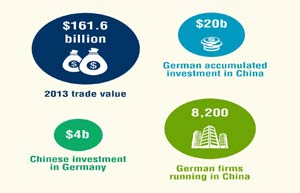Mature vocational system to aid growth
Updated: 2014-07-28 06:59
By Wang Chao (China Daily)
|
|||||||||||
As with German products in the early days, those selling anything made in China now strive to break its "cheap and inferior quality" image, he says. That means China can learn from Germany.
"Improving the image of 'Made in China' involves not only raising and sustaining the quality of products, but also improving the standards in factories with regard to social, environmental and other issues.
"Both government bodies and industrial associations can push this process, for example, by setting regulations or encouraging companies to voluntarily adhere to certain standards."
|
|
|
|
"It's true that China is likely to lose its cheap labor advantage due to a diminishing labor supply. To deal with that and maintain the competitiveness of its economy, it will have to increase the productivity of its human capital."
This will include introducing advanced management skills to better control cost and boost efficiency on the one hand, and developing its own innovations rather than keep relying solely on playing technological catch-up instead, on the other, Berger says.
"Also, China should nurture a mature vocational training system that is closely and dynamically linked to industry. It would not only provide a steady supply of highly skilled graduates, but also help avoid unemployment among young people.
"Similar to Germany's vocational training system, the Chinese government should, first, expand the legal and administrative framework for vocational traineeships; second, encourage Chinese companies to engage in building a systematic vocational training system that delivers the skills they need and, third, campaign for the acceptance of high-skilled vocational training as a solid start to a successful career, which is in many cases is equal or even preferable to a university degree with theoretical knowledge and uncertain prospects."
As China transforms its manufacturing, the two countries will have many opportunities to work together, Berger says.
German companies have played a key role in China's economic and technological development, and Chinese companies that have gone global have found an open door for outbound investment in Germany, he says.
Today's Top News
Developers placing bets on casinos overseas
Scrutiny on iPhone data access
Russian fighter jet crash kills pilot
US-Russia relations frosty
Harsher safety measures urged amid scandal
Drills to have 'little impact' on civilian air services
Revision of decree protects military airports
Experts slam Japan's bid to break order
Hot Topics
Lunar probe , China growth forecasts, Emission rules get tougher, China seen through 'colored lens', International board,
Editor's Picks

|

|

|

|

|

|







